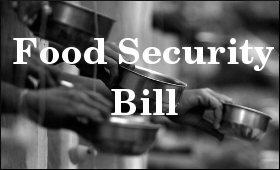|

|
Govt likely to amend Food Security Bill
|
|

|
|
| Top Stories |
 |
|
|
|
SME Times News Bureau | 22 Aug, 2013
The government is ready to move fresh amendments to the Food Security Bill to address some concerns of the opposition parties who have proposed 265 changes to the legislation, informed sources said Wednesday.
The government hopes the bill, which could not be taken up in parliament on Tuesday, would be debated and passed in the Lok Sabha on Thursday.
According to the sources, most of the amendments moved by the opposition relate to making the coverage universal, including pulses, oils and sugar besides grains, increasing entitlement to food grains from five to seven kg per person per month and removing the provision of cash transfers.
Together, the opposition parties like the Bharataiya Janata Party, Communist Party of India-Marxist (CPI-M), Communist Party of India, Samajwadi Party (SP), Bahujan Samaj Party (BSP), Janata Dal-United, Biju Janata Dal (BJD), Akali Dal, DMK, AIADMK and Trinamool Congress have moved around 265 amendments to the Food Security Bill.
Both the SP and the BSP have said they support the bill but want their changes to be approved.
The changes suggested vary from party to party, but there are some common issues as well.
While some CPI-M members favour a universal coverage for the entire population - up from 67 percent of the population proposed in the bill - others in the party want income tax payees to be excluded.
Some Left and Akali Dal members want inclusion of pulses, sugar and oils besides rice, wheat and coarse grains.
While the DMK wants allocation of grains to states under the existing public distribution to continue, AIADMK wants Tamil Nadu to be excluded from the bill.
The Trinamool Congress wants a coverage of 90 percent of the population in rural areas and 75 percent in urban areas.
Many members from the Left, and BJP leaders like Sushma Swaraj and Murli Manohar Joshi, want the government to delete the reforms based on unique identity number Aadhar and a provision of cash transfers.
Some BJP members want deletion of the definition of food security allowance to be paid in case the government is not able to provide grains. Some other MPs want the centre to pay the allowance.
While some Left members want the central government to fund the scheme to provide one free meal per day to the destitute, those of the BJP and the BJD want two free meals to the destitute and affordable meals to the homeless.
Touching upon the integrated child development scheme run by the centre, many Left and BJP members want the government to delete the reference to "ready to eat meal" and have said that no private contractor should be engaged for it and preference should be given to women's self help groups.
They also want the government to take care of malnourished children and make provisions for children who are out of school.
To protect the interests of farmers, some Left and BJP members want the definition of the minimum support price at which the government buys grains from them to be 1.5 times of the cost of production.
Others want the government to open procurement centres every 10 km.
The Food Security Bill aims to provide subsidised food grain at prices much below the market rate to around 67 percent of India's 1.2 billion people; the bill would thus benefit about 800 million people.
The bill will cost the government around Rs.1,24,723 crore and will entail an additional burden of only Rs.23,800 crore, the Congress has said.
The Food Security Bill was first introduced in parliament in December 2011. It remained with a standing committee for a year before it was taken to the Lok Sabha for consideration and passing in the budget session that ended May 8.
Food Minister K.V. Thomas said the government was already procuring an average of 60.2 million tonnes of foodgrain in the past four years and would have no difficulty in managing the 61.2 million tonnes needed under the bill.
|
|
|
| |
|
|
|
|
|
|
|
|
|
|
|
|
|
|
| |
| Customs Exchange Rates |
| Currency |
Import |
Export |
US Dollar
|
₹91.35
|
89.65 |
UK Pound
|
₹125.3
|
₹121.3 |
Euro
|
₹108.5
|
₹104.85 |
| Japanese
Yen |
₹58.65 |
₹56.8 |
| As on 19 Feb, 2026 |
|
|
| Daily Poll |
 |
 |
| What is your primary "Make or Break" expectation from the Finance Minister this year? |
|
|
|
|
|
| Commented Stories |
 |
|
|
|
|
|
| |
|